Richard Dawkins
Science vs. Religion quotes
But before detailing them a couple of brief religious and philosophical propositions will be mentioned:
There are two worlds, the microcosm, and the macrocosm, the internal and the external. We get truth from both of these by means of experience. The truth
gathered from internal experience is psychology, metaphysics, and religion; from external experience, the physical sciences. Now a perfect truth should
be in harmony with experiences in both these worlds. The microcosm must bear testimony to the macrocosm, and the macrocosm to the microcosm; physical
truth must have its counterpart in the internal world, and the internal world must have its verification outside. Yet, as a rule, we find that many of
these truths are in conflict. At one period of the world's history, the internals become supreme, and they begin to fight the externals. At the present
time the externals, the physicists, have become supreme, and they have put down many claims of psychologists and metaphysicians.
This quotes source:-
Swami Vivekananda - Cosmology
This quotes source:-
Swami Vivekananda - Cosmology
Inspiration can ~ occasionally ~ trounce Reason!!!
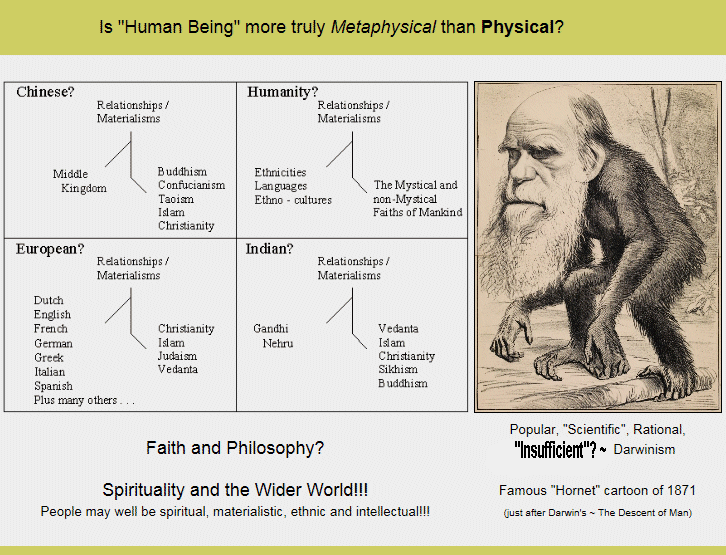

On Thursday, 31 January, 2013 Richard Dawkins participated in a debate on the motion - This house believes that Religion has no place in the 21st Century - held at the Cambridge Union Society; a famous 200-year-old debating club associated with Cambridge University in England.
As the debate began it was stressed that it was the place of organised religion that was being considered rather than individual religious endeavours or searches for meaning.
During his turn to speak, (immediately after the contribution of a recently retired Archbishop of Canterbury), Richard Dawkins, surprise, surprise, favored of the motion.
He opened by saying that he saw himself "as speaking as a scientist passionate about scientific truth" and stressed that his central concern was simply "whether religion is true", and, after suggesting that religious belief was made less possible by Darwinian science said that:-
"to a scientist, however, what's really objectionable about religion is that we should be satisfied with a non-explanation to a difficult question instead of working hard to provide a real explanation".
Richard Dawkins, in bringing his ten-minute long presentation to an close, summed up his Religion vs Science argument in a few high-flown sentences, describing religion as:-
"a cop-out: a betrayal of the intellect, a betrayal of all that's best about what makes us human,
a phony substitute for an explanation, which seems to answer the question until you examine it and realise that it
does no such thing.
Religion in science is not just redundant and irrelevant, its an active and pernicious charlatan. It peddles false explanations, or at least pseudo-explanations, where real explanations could have been offered, and will be offered. Pseudo-explanations that get in the way of the enterprise of discovering real explanations.
As the centuries go by religion has les and less room to exist and perform its obscurantist interference with the search for truth.
In the 21st century its high time, finally, to send it packing".
Religion in science is not just redundant and irrelevant, its an active and pernicious charlatan. It peddles false explanations, or at least pseudo-explanations, where real explanations could have been offered, and will be offered. Pseudo-explanations that get in the way of the enterprise of discovering real explanations.
As the centuries go by religion has les and less room to exist and perform its obscurantist interference with the search for truth.
In the 21st century its high time, finally, to send it packing".

Richard Dawkins' yet more recent and, indeed, notably high-profile project, a documentary film entitled The Unbelievers prepared in intellectual collaboration with a physicist named Lawrence Krauss, has also provided those interested in his views with an opportunity to review direct quotations and quotes which reveal Richard Dawkins' thoughts on science vs. religion.
Since 2006 Richard Dawkins and Lawrence Krauss have jointly participated in various public presentations of their shared viewpoints that hold that it would be better if Religion was no longer of relevance as a political or a social force and that Science can provide fully legitimate explanations of The Existence of the Universe and of Mankind here on Earth.
[As we shall see this intellectual collaboration began after Richard Dawkins and Lawrence Krauss first met and experienced something of a meeting of minds on science vs. religion related issues]!!!
A filmmaker named Gus Holwerda has been involved in a project that has chronicled the shared involvement of Richard Dawkins and Lawrence Krauss over several years in their efforts to promote acceptance of Science, and Scientifically accepted truths in preference to Religion, and what are asserted as Religious Truths.
The project has culminated in the preparation for public release of a feature film length documentary presentation, entitled ~ The Unbelievers.
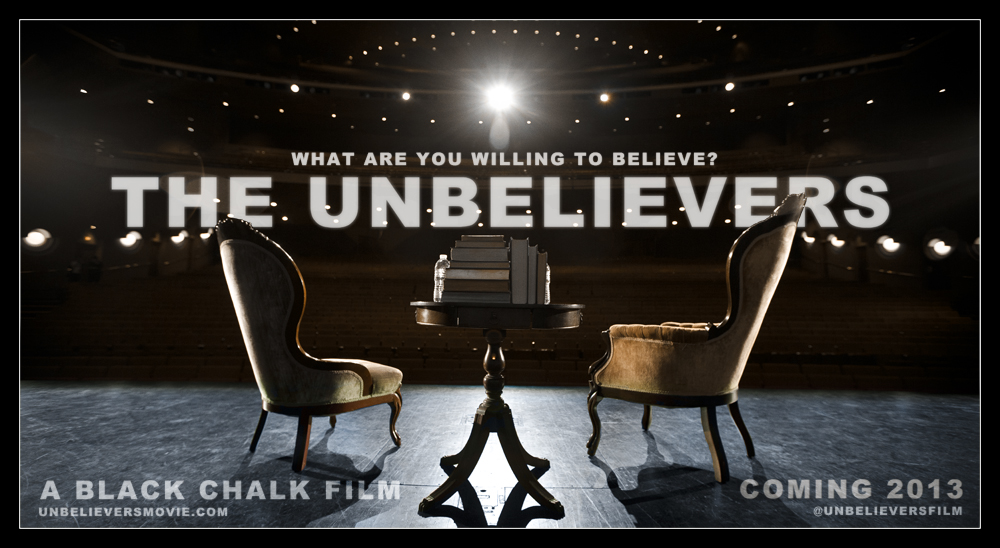
A promotional trailer to this film was launched in February, 2013 and became widely available on the web.
The Black Chalk Films sponsored YouTube site for the film's trailer, (available at http://www.youtube.com/watch?v=ZxDLkoK8vQQ), gave The Unbelievers this outline description :-
The Unbelievers follows renowned scientists Richard Dawkins and Lawrence Krauss across the globe as they speak publicly about the importance of science and reason
in the modern world - encouraging others to cast off antiquated religious and politically motivated approaches toward important current issues.
The film includes interviews with celebrities and other influential people who support the work of these controversial speakers.
The film includes interviews with celebrities and other influential people who support the work of these controversial speakers.
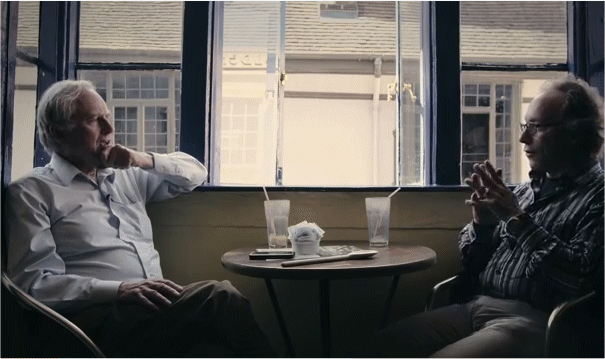
The Unbelievers promotional trailer was released on February 8, 2013,
and began with Lawrence Krauss asking Richard Dawkins:-
"Which is more important - to explain science or to destroy religion"?
The trailer moves on before Dawkins' answer can be heard.
Richard Dawkins and Lawrence Krauss subsequently gave many joint interviews in association with the The Unbelievers film's official premiere where their respective views in relation to the science versus religion controversy were openly voiced.
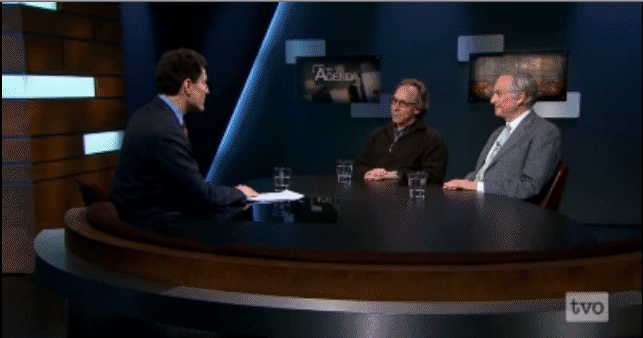
On the morning of 30 April, 2013, Richard Dawkins and Lawrence Krauss were jointly interviewed by Steve Paikin in relation to their documentary film The Unbelievers which had premiered the previous evening.
[Visitors are welcome to continue reading our page for some of the interview highlights related to science versus religion issues, and presented as transcripted quotations and quotes, or to view this thirty-two minute long interview from The Agenda with Steve Paikin at:-
http://ww3.tvo.org/video/190768/rise-new-atheists]
Evolutionary biologist Dawkins and theoretical physicist Krauss recounted that when they first met they had a wide-ranging debate specifically about, as Dawkins said, "whether we should have a kind of full-on attack on religion or whether we should, as Lawrence preferred, seduce them." When Steve Paikin suggested to Dawkins that he preferred "all-out" attack Krauss, laughing, seemed to agree and said "and I prefer to seduce them."
Richard Dawkins and Lawrence Krauss agree that both approaches have merit depending on the nature of the people being targeted. Krauss explained that this is really "a strategic question."
Lawrence Krauss described this debate as having been "a really substantive discussion which I found enlightening". That, initial, debate between Richard Dawkins and Lawrence Krauss seems to have given rise to an intellectual and personal friendship between the two scientists. Krauss, speaking of that debate, "thought (it) to be an interesting dialogue to try to put down", and Richard Dawkins remembered a joint article having been prepared outlining their debate, which was subsequently published in a popular scientific magazine.

As the interview proceeds the science vs. religion issue is fairly directly touched on in ways which yielded several quotations and quotes worthy, in efforts to understand Richard Dawkins' and Lawrence Krauss' intellectual outlooks, of transcripted repetition.
At one point in the interview Steve Paikin asks Richard Dawkins and Lawrence Krauss:-
"What would you like people to take from The Unbelievers having seen it?"
Richard Dawkins replied:-
"I'd like them to be stimulated to think, to think critically, to go away and to think about it afterwards,
to talk about it afterwards. To have their beliefs shaken a bit, shaken enough that they'll discuss them with
each other. Discuss it with themselves and maybe come to a different conclusion."
Shortly thereafter, in reponse to Steve Paikin's question "are you concerned that only atheists are going to see The Unbelievers?"
Lawrence Krauss says:-
"I agree with Richard that the point of this is to stimulate discussion.
And that I like to think that we don't preach. In the sense that we are not trying to tell people what to think.
We're just trying to encourage people to (A) question - and everything should be subject to question - including Religion...
...the second thing is there is a lot of discussion of the beauty and wonder of, and Richard describes this beautifully in
the film in my opinion, the beauty and wonder of the Universe."
Steve Paikin asked the pair:-
"How would you characterise the following person; he, or she, is utterly uninterested in the question
of whether God exists but he or she considers himself, or herself, deeply spiritual.
How do you characterise that kind of a person?"
Richard Dawkins, (at the beginning of what to be a notable flurry of interaction between himself, Lawrence Krauss and Steve Paikin), replied:-
How do you characterise that kind of a person?"
"Well I consider myself deeply spiritual in one sense, in the same sense that, perhaps, Carl Sagan
would have done where I feel deeply moved in a poetic way by the sight of the milky way, by contemplation of the size
of the Universe, by contemplation of the immense span of geological time, by looking down a microscope at a single cell,
and seeing the intricate structure of a single cell and then reflecting that that cell is multiplied up trillions of
times in my own body"...
Steve Paikin interjects:- "That's not the spirituality that I'm thing of."
Richard Dawkins resumes:- "Well it's the spirituality I'm thinking of..."
Lawrence Krauss then contributes:- "And it's a better spirituality, I've said this again publicly too, I think one of the big misunderstandings and abuses of the discussion of science is that science takes away spirituality, which is really awe and wonder and a sense of something bigger than oneself, but the stuff that is bigger than oneself doesn't have to be unreal - it can be real and part of an amazing cosmos, as I like to say - being completely insignificant is uplifting and can be a spiritual experience - ...
... the spirituality of science is better than the spiritualty of religion because it is real. But I will say that I think the person you are describing, and there's many of them, is a new breed of people, more and more people are becoming disillusioned by organised religion because of information, by realising how silly it is ultimately, but they don't want to lose what they are getting from organised religion so they transfer to this concept of spirituality - a oneness with the universe - and I think that people like that - we are hard wired, I think, to want that and there are many things that religion provides that we are hard wired for, the key thing for me is sure we recognise that religion provides things consolation, community, but the key thing is that it doesn't have to be religion that provides those things."
Steve Paikin interjects:- "Did I hear you just say we are hard wired to find spiritual meaning in life."
Lawrence Krauss resumes:- "I think, certainly, yea, I think we are - there is evolutionary advantages I think..."
Steve Paikin:- "So the quest for God, or a belief in God, is not illogical at all? We are hard..."
Richard Dawkins to Steve Paikin:- "You just said to me that that is not the kind of spirituality I'm interested in. What kind of spirituality are you interested in?"
Steve Paikin:- "Well I guess I was thinking about ... people may not feel the need to go into a house of worship and yet they somehow still have a connection to the morality that comes out of religion..."
Richard Dawkins:- "Morality is another matter......"
Lawrence Krauss to Steve Paikin:- "You just jumped in - you said that wasn't irrational - the point is just because we're hard wired to do something doesn't make it rational. We're hard wired to do a lot of things that aren't rational. We're hard wired to be xenophobic in some ways, its not clear love is rational, and so there's lots of aspects of being human that don't relate to being rational - and understanding that is important if we want to deal with the real world and to try to make the world a better place."
Steve Paikin:- "So Science can be spiritual?"
Richard Dawkins:- "You are playing with words ... It depends what you mean, if you mean something supernatural, no, if you mean what Lawrence just called awe and wonder, and what Carl Sagan would have called awe and wonder, yes, certainly."
Lawrence Krauss:- "And we should celebrate that - that's the point - I mean people think science takes away - I mean we're not the first ones to say this - as Richard said, Carl Sagan said it you know - Richard Feinmann - talked about how understanding how a rainbow worked doesn't make it less beautiful it makes it more beautiful but somehow people get the sense that science is cold hard facts and therefore boring and also dehumanising and I think my goal, and I believe Richard's goal, is to disabuse people of that misconception. Science is wonderful, it's fun, its exciting, its enjoyable and pleasing to understand as listening to a sonnet or listening to a beautiful piece of music."
The interviewer concluded by asking Richard Dawkins and Lawrence Krauss:-
Steve Paikin interjects:- "That's not the spirituality that I'm thing of."
Richard Dawkins resumes:- "Well it's the spirituality I'm thinking of..."
Lawrence Krauss then contributes:- "And it's a better spirituality, I've said this again publicly too, I think one of the big misunderstandings and abuses of the discussion of science is that science takes away spirituality, which is really awe and wonder and a sense of something bigger than oneself, but the stuff that is bigger than oneself doesn't have to be unreal - it can be real and part of an amazing cosmos, as I like to say - being completely insignificant is uplifting and can be a spiritual experience - ...
... the spirituality of science is better than the spiritualty of religion because it is real. But I will say that I think the person you are describing, and there's many of them, is a new breed of people, more and more people are becoming disillusioned by organised religion because of information, by realising how silly it is ultimately, but they don't want to lose what they are getting from organised religion so they transfer to this concept of spirituality - a oneness with the universe - and I think that people like that - we are hard wired, I think, to want that and there are many things that religion provides that we are hard wired for, the key thing for me is sure we recognise that religion provides things consolation, community, but the key thing is that it doesn't have to be religion that provides those things."
Steve Paikin interjects:- "Did I hear you just say we are hard wired to find spiritual meaning in life."
Lawrence Krauss resumes:- "I think, certainly, yea, I think we are - there is evolutionary advantages I think..."
Steve Paikin:- "So the quest for God, or a belief in God, is not illogical at all? We are hard..."
Richard Dawkins to Steve Paikin:- "You just said to me that that is not the kind of spirituality I'm interested in. What kind of spirituality are you interested in?"
Steve Paikin:- "Well I guess I was thinking about ... people may not feel the need to go into a house of worship and yet they somehow still have a connection to the morality that comes out of religion..."
Richard Dawkins:- "Morality is another matter......"
Lawrence Krauss to Steve Paikin:- "You just jumped in - you said that wasn't irrational - the point is just because we're hard wired to do something doesn't make it rational. We're hard wired to do a lot of things that aren't rational. We're hard wired to be xenophobic in some ways, its not clear love is rational, and so there's lots of aspects of being human that don't relate to being rational - and understanding that is important if we want to deal with the real world and to try to make the world a better place."
Steve Paikin:- "So Science can be spiritual?"
Richard Dawkins:- "You are playing with words ... It depends what you mean, if you mean something supernatural, no, if you mean what Lawrence just called awe and wonder, and what Carl Sagan would have called awe and wonder, yes, certainly."
Lawrence Krauss:- "And we should celebrate that - that's the point - I mean people think science takes away - I mean we're not the first ones to say this - as Richard said, Carl Sagan said it you know - Richard Feinmann - talked about how understanding how a rainbow worked doesn't make it less beautiful it makes it more beautiful but somehow people get the sense that science is cold hard facts and therefore boring and also dehumanising and I think my goal, and I believe Richard's goal, is to disabuse people of that misconception. Science is wonderful, it's fun, its exciting, its enjoyable and pleasing to understand as listening to a sonnet or listening to a beautiful piece of music."
"Is it your hope or expectation that you can, in your words I guess, rid this world of religion?"
Richard Dawkins answered:-
"I'm not sure how soon, I think religion is declining, Christianity is declining throughout Christendom.
And I think that that's going to continue. If you look at the broad sweep of history, it's clear that the trend is going in the right
direction. I'm not so optimistic now that it will be in my lifetime, but it will happen, yes."
Steve Paikin to Lawrence Krauss:-
"Last minute to you."
Lawrence Krauss:-
"I would agree in that sense ... when I was young in the sixties, which will date me, I would have thought by now ... that religion would be gone, I mean in the sixties
it just seemed that religion was on the way out ... I was kind of surprised and disappointed in some ways by the resurgence of fundamentalism in my country but I do think its
is obvious that access to information and knowledge is decreasing, - and its in every country that you can look at - the numbers of peoples who define themselves as
religious, including the United States which is a very religious country...
In this, his concluding contribution, Lawrence Krauss revealed his on-going preference for Science versus Religion:-
...It can be helped, and I believe very importantly, by pointing out that its OK to ask questions about religion like anything else."
In this, his concluding contribution, Lawrence Krauss revealed his on-going preference for Science versus Religion:-
...It can be helped, and I believe very importantly, by pointing out that its OK to ask questions about religion like anything else."
Should Science Speak to Faith?
A dialog between Lawrence Krauss and Richard Dawkins
Some quotes from the page content of a Richard Dawkins Foundation for Reason and Science web page of June 2007,
available, in early May, 2013, at http://old.richarddawkins.net/articles/1224, specifically mention the background to the first meeting and early
collaboration of Richard Dawkins and Lawrence Krauss.
An EDITORS' INTRODUCTION, suggests that an open letter Lawrence Krauss sent to Pope Benedict XVI in 2005, urging the pontiff not to build new walls between science and faith, led the Vatican to reaffirm the Catholic Church's acceptance of natural selection as a valid scientific theory.
Speaking of an article entitled Should Science Speak to Faith? A dialog between Lawrence Krauss and Richard Dawkins appearing in Scientific American Magazine's June, 2007, issue the Editors Introduction concludes with these sentences:-
These two allies compared notes from the front lines during breaks at a conference devoted to discussing clashes between science and religion held at the
Salk Institute for Biological Studies in San Diego late last year. In a dialogue they re-create here, the authors explained their respective tactics for engaging the
enemy and tackled some of the questions that face all scientists when deciding whether and how to talk to the faithful about science: Is the goal to teach science
or to discredit religion? Can the two worldviews ever enrich one another? Is religion inherently bad? In an extended version of their conversation available at
www.SciAm.com/ontheweb, the authors also delve into whether science can ever test the "God Hypothesis."
Some sample quotes from the main article available at http://old.richarddawkins.net/articles/1224 are perhaps particularly relevant to
appreciating Richard Dawkins' and Lawrence Krauss' evidently long-held preference for Science vs. Religion:-
Krauss:- "Still another benefit science has to offer was presented most cogently by Carl Sagan, who, like you and me, was not a person of faith. Nevertheless, in
a posthumous compilation of his 1985 Gifford Lectures in Scotland on science and religion, he makes the point that standard religious wonder is in fact too myopic, too limited.
A single world is too puny for a real God. The vast scope of our universe, revealed to us by science, is far grander. Moreover, one might now add, in light of the current vogue
in theoretical physics, that a single universe may be too puny and that one might want to start thinking in terms of a host of universes. I hasten to add, however, that enriching
faith is far different than providing supporting evidence for faith, which is something that I believe science certainly does not do."
Dawkins:- "Yes, I love that sentiment of Sagan's, and I'm so glad you picked it out. I summed it up for the publishers of those lectures on the book jacket: 'Was Carl Sagan a religious man? He was so much more. He left behind the petty, parochial, medieval world of the conventionally religious; left the theologians, priests and mullahs wallowing in their small-minded spiritual poverty. He left them behind, because he had so much more to be religious about. They have their Bronze Age myths, medieval superstitions and childish wishful thinking. He had the universe.' I don't think there is anything I can add in answering your question about whether science can enrich faith. It can, in the sense you and Sagan mean. But I'd hate to be misunderstood as endorsing faith."
If we may be forgiven for saying so the main article available at the Richard Dawkins Foundation web site is poorly presented through
not being particularly well formatted, (this is an an "old" article).Dawkins:- "Yes, I love that sentiment of Sagan's, and I'm so glad you picked it out. I summed it up for the publishers of those lectures on the book jacket: 'Was Carl Sagan a religious man? He was so much more. He left behind the petty, parochial, medieval world of the conventionally religious; left the theologians, priests and mullahs wallowing in their small-minded spiritual poverty. He left them behind, because he had so much more to be religious about. They have their Bronze Age myths, medieval superstitions and childish wishful thinking. He had the universe.' I don't think there is anything I can add in answering your question about whether science can enrich faith. It can, in the sense you and Sagan mean. But I'd hate to be misunderstood as endorsing faith."
The currently maintained Richard Dawkins Foundation web content appears at another URL.
A "cleaner" version of this article may be available, (courtesy of Lawrence Krauss), at http://genesis1.asu.edu/krausssdawk.html

According to Ralph Waldo Emerson -
"The religion that is afraid of science dishonors God ... It acknowledges that it is not equal to the whole of truth, that it legislates, tyrannizes
over a village of God's empires but is not the immutable universal law."
Explore Inner Space!!!
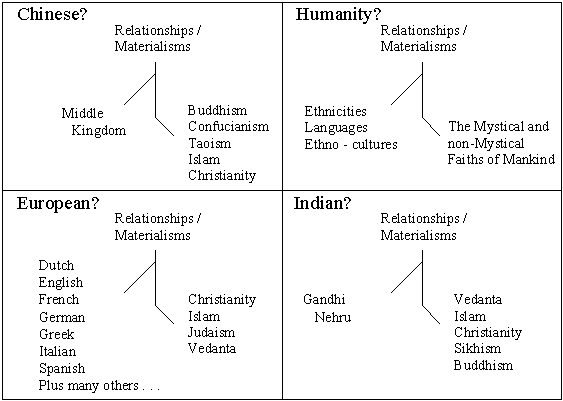
It is widely known that Plato, pupil of and close friend to Socrates, accepted that Human Beings have a " Tripartite Soul " where individual Human Psychology is composed of three aspects - Wisdom-Rationality, Spirited-Will and Appetite-Desire.
What is less widely appreciated is that such major World Faiths as Christianity, Islam, Hinduism, Buddhism and Sikhism see "Spirituality" as being relative to "Desire" and to "Wrath".
According to Ralph Waldo Emerson -
..."man is a bundle of relations, a knot of roots, whose
flower and fruitage is the world..." Ralph Waldo Emerson
This brief Emerson quote, from his essay 'History', actually appears in an highly significant context:-
flower and fruitage is the world..." Ralph Waldo Emerson
"In old Rome the public roads beginning at the Forum
proceeded north, south, east, west, to the centre of every
province of the empire, making each market-town of Persia, Spain,
and Britain pervious to the soldiers of the capital: so out of
the human heart go, as it were, highways to the heart of every
object in nature, to reduce it under the dominion of man. A man
is a bundle of relations, a knot of roots, whose flower and
fruitage is the world. His faculties refer to natures out of him,
and predict the world he is to inhabit, as the fins of the fish
foreshow that water exists, or the wings of an eagle in the egg
presuppose air. He cannot live without a world".
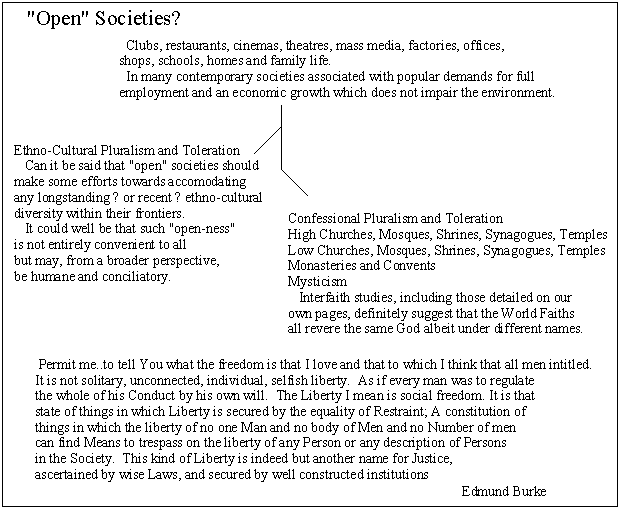
In an essay entitled "The Over-Soul" Ralph Waldo Emerson wrote that:-
"...The soul looketh steadily forwards, creating a world before her, leaving worlds behind her. She has no dates, nor rites, nor
persons, nor specialties, nor men. The soul knows only the soul; the web of events is the flowing robe in which she is
clothed. ..."

..."You will hear things like, 'Science doesn't know everything.' Well, of course science doesn't know everything. But, because science doesn't know everything, it doesn't mean that science knows nothing. Science knows enough for us to be watched by a few million people now on television, for these lights to be working, for quite extraordinary miracles to have taken place in terms of the harnessing of the physical world and our dim approaches towards understanding it. And as Wittgenstein quite rightly said, 'When we understand every single secret of the universe, there will still be left the eternal mystery of the human heart.'"...
From Stephen Fry's March, 2001, appearance on Room 101.
According to Albert Einstein:-
"Science can only ascertain what is, but not what should be, and outside of its domain value judgments of all kinds remain necessary.
Religion, on the other hand, deals only with evaluations of human thought and action: it cannot justifiably speak of facts and relationships between facts."
